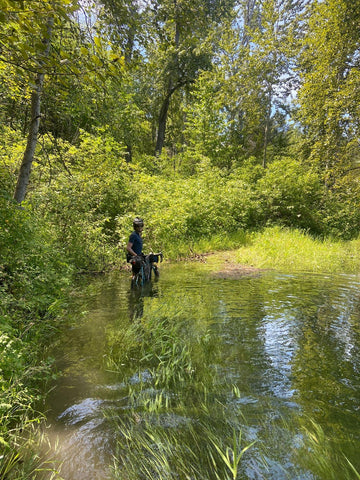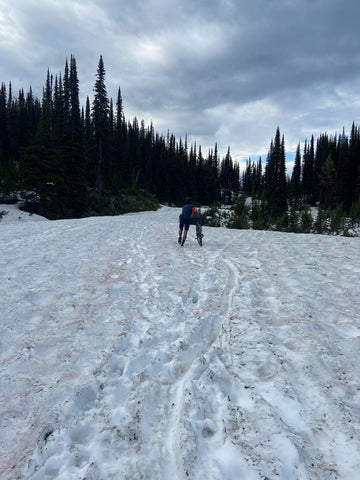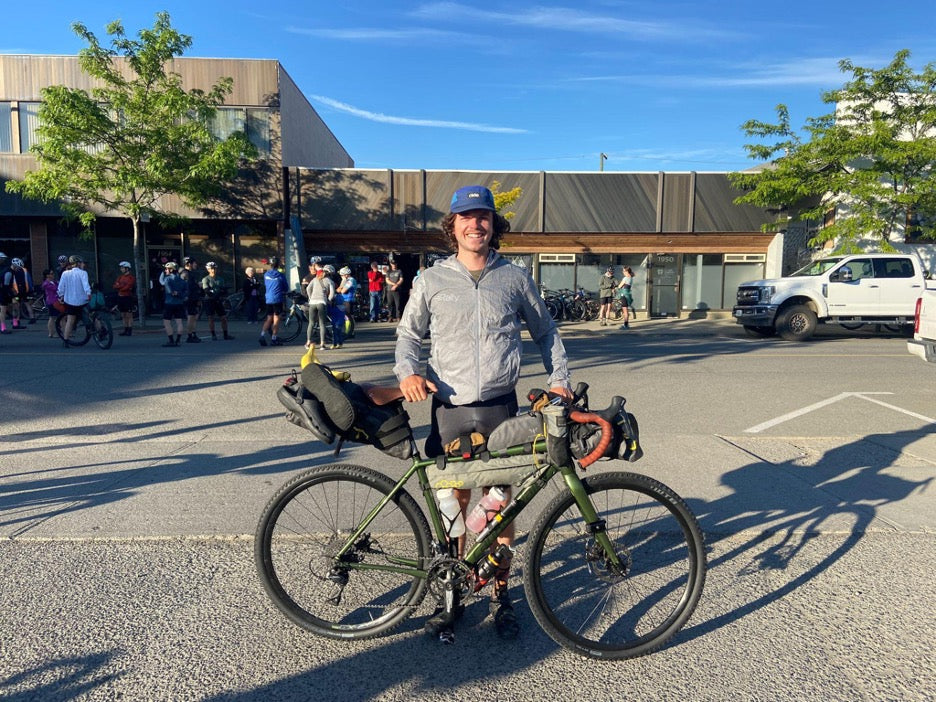June 2022: What can you learn from a 1,066 km ultra bike-packing race?
I have always been asked why bike-pack? For me, it’s the chance to see our world from a different perspective. It is the opportunity to take the path less traveled, to be emersed by the sound of gravel under your tires, alerted by the change in smell as the flora transforms around you, and be present by the feeling of always maintaining a sense of momentum. When you are on the road, you don't know what every day will bring you, yet one is continuously driven to explore as you have no other commitments than to ride your bike all day. For me, this is why I bike-pack.
Coming off of a 28-day, 3,100 km bike ride from Canada to Mexico, I found myself standing at the start line in Merritt BC for the BC EPIC 1000 gravel race eagerly wanting to explore where my limits might lie. The BC Epic 1000 is a 1,066K traverse across south-central British Columbia starting in Merritt and ending in Fernie. It takes in 11,000 m of elevation gain and mostly follows the Trans Canada Trail with approximately 80-90 percent of the route being off-road and about 100k on a single track [1]. Over the course of the 3 days, 19 hours, and 25 minutes of riding to earn an 8th place finish; I experienced mountain passes still covered in snow resulting in 4km+ of bike walking, flooded rivers causing you to push your bike through waste deep water, lack of sleep leading to hallucinations that ultra backpackers are familiar with, a case of horrific chafing from sitting on the saddle for over 23 hours straight, a broken bike that resulted in 950 km of the race being completed without a front derailer and a broken rear freehub drive causing me to push my bike for all ascents of the final 25 km's of the race through the night. Finally, I experienced a true sense of personal accomplishment when rolling to the finish line at 3:30 am. As I reflect on the journey, I've redefined three basic, yet fundamental life lessons:
Life Lessons:
- Seek and embrace discomfort: When on the saddle, constantly teetering on the line of your limits, you don't necessarily find yourself in a position of comfort too often; unless you're crawling into your Bivy [2] to catch a couple of hours of shut-eye in the early hours of the night. Yet, when you find yourself in these moments of discomfort, you also find yourself in a position of vulnerability, which correlates to creating the ideal environment for accelerated learning about yourself. The way that you react, make decisions, motivate yourself, respond to the negative thoughts in your head, and persevere in this discomfort state, creates a unique equation that if harnessed and reflected on properly, lets you learn about yourself and improve the way you operate. Life will always provide us with uncomfortable situations. If we can increase our exposure to this uncomfortable state, we can increase our ability and tolerance to discomfort which in turn will equip us with the right skill set to challenge the uncertainty that life will bring us.
- Master the basics: When bike-packing, your day-to-day responsibilities get synthesized down into finite objectives focused on biking, eating, and drinking water to continue moving forward. Yes, there are additional factors you need to consider, but ultimately your main priorities are limited. What you realize while bike-packing is if you can master these basics in terms of ensuring you are adequately prepared to bike, and pro-actively are managing your nutrient intake and water consumption, your capacity for other elements of the bike-packing journey, such as seeing and appreciating the iconic landscapes around you, and engaging in conversations with others who's paths you cross are increased. In the hustle and bustle of the game of life, there are substantial stimulants and distractions that can sometimes take over and be prioritized over the fundamental basics. It's important to make sure we purposefully remind ourselves to prioritize the basics for ourselves and know that mastered basics will provide us with increased capacity to operate in the long term.
- Purposefully disconnect and reflect: While biking for 23+ hours straight in the remote back-country of British Columbia, your ability to be connected is impeded. Even when you enter towns where cell reception is present, your priorities shift away from being connected and are focused on fueling yourself for the next section of the ride. While bike-packing, finding the time to be purposefully disconnected comes naturally, and the benefits are substantial. By providing your mind the opportunity to reflect, you let your mind wander, allow yourself to think about thoughts that normally don't have space to occupy your mind and reflect on the past hour, days or months to learn from what happened in certain situations. This reflection ultimately aids in developing and improving your future self. In life, and in the technological era we live in, we are consistently connected and being stimulated on multiple different platforms and channels. This technological overload and stimulation can sometimes even happen in the brief minutes we have between meetings where we find ourselves responding to or checking in on multiple communication channels rather than taking a micro-moment of reflection for ourselves and a pulse check on the outcomes of our previous meeting. Although challenging at times, prioritizing and taking the time to be disconnected for reflective practice can enable us to achieve better awareness of ourselves, increase our knowledge and understanding of certain situations, and improve our life skills and competencies.
As I reflect on the race, I've come to realize that these big rides are really personal, what you get out of it is really for yourself. Throughout the duration of the race, you've been through so much hardship, and challenge, yet you are the one that continues to want to put yourself back in that situation. It's the same concept when people say or have the idea that your must love to suffer, but we are not suffering. Suffering is something that happens to you that you cannot control. If you are engaging in a bike race or challenging ride, you are the one that is making that decision to participate, you need to own it, be a part of it, and embrace the uncertainty ahead. As I re-enter a more constant day-to-day way of living, I look forward to maintaining the memories and life lessons learned while ultra bike-pack racing.
Definitions
[1] Single track is a type of biking trail that is narrow and approximately the width of the bike
[2] A Bivy is short for “Bivouac sack”. A bivy is a temporary lightweight structure designed to provide emergency weather protection for sleeping bags (i.e., a thin waterproof liner that goes around you and your sleeping bag)
Photos

Photo: 20-minutes prior to starting the race, in Merrit BC
Km into the race: 0

Photo: Fellow rider, Everett, entering the flooded section of the race
Km into the race: 645

Photo: Day 3: Fellow rider, Everett, walking his bike through Grey Creek Pass. Grey Creek Pass is a 1,500 m elevation gain pass in 26.5 km, making it the highest dirt pass in Canada. The 2,100 m pass runs between Kootenay lake on the west and Kimberly to the east through the Kootenay range. As this year’s snowfall was substantial, the summit and higher elevation sections of the pass were still covered in snowfall. Km into the race: 790

Photo(s): Day 3: 150 km’s before the finish line in Cranbrook, BC. This was the last spot to take a break and fuel up prior to finishing the last section of the race in the evening / night and what candid fatigue and exhaustion looks like.
Km into the race: 916

Photo: Day 3: 100 km from the finish line and last section of pavement before entering the final pass from Elko into Fernie.
Km into the race: 966

Photo: Day 3: 1:00 am in the morning, taking a rest to drink some water from a stream prior to continuing to push my bike up the final climb due to my freehub breaking and having no ability to pedal. Km into the race: 1,046

